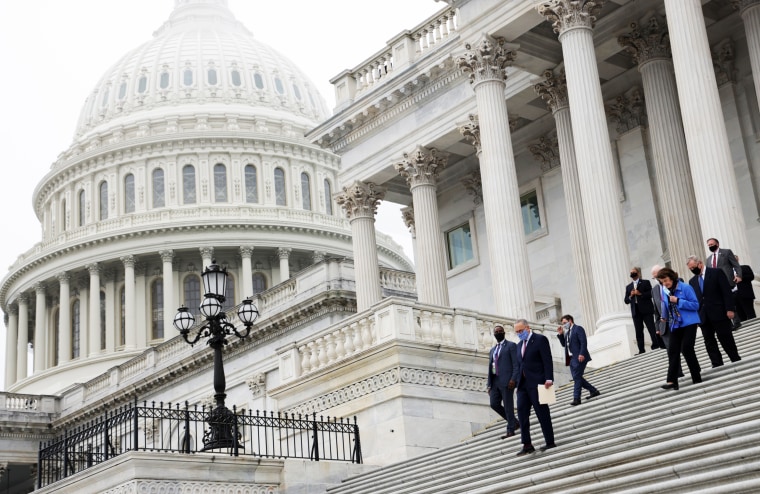Rep. Alexandria Ocasio-Cortez (D-N.Y.) raised a few eyebrows yesterday by reminding her colleagues about the unforgiving calendar.
Rep. Alexandria Ocasio-Cortez (D-N.Y.) warned Senate Democrats that they are bound to repeat history if they lose time negotiating with Republicans instead of taking advantage of their control of Congress and the White House. "Dems are burning precious time & impact negotiating w/GOP who won't even vote for a Jan 6 commission," she tweeted. "McConnell's plan is to run out the clock. It's a hustle. We need to move now."
In the same tweet, the New York congresswoman added that at the start of the Obama era, many thought Democrats would have a 60-vote majority in the Senate for a while. "It lasted four months," she noted.
That's true. Though there's an annoying myth that Senate Dems had 60 votes for the first two years of Barack Obama's presidency, the party's supermajority spanned just four months, during which time Democrats approved the Affordable Care Act. (Ocasio-Cortez knows of what she speaks: she was an intern for Sen. Ted Kennedy at the time.)
Those who thought at the time that Democrats could be patient, and waste months negotiating with Republicans on possible agreements GOP senators would end up rejecting anyway, were taught a valuable lesson -- which seems quite applicable now.
The question, of course, is what Democrats intend to do with the clicking clock.
Bloomberg's Jonathan Bernstein made a compelling case this week that the party could agree to scrap Congress' August recess, giving Dems more time to do the people's business. It's a provocative point -- members have looked forward to their August breaks for quite a while, in part because the Capitol didn't use to have air conditioning and D.C. summers can get quite unpleasant -- but it deserves serious consideration.
Remember, at face value, Senate Democrats have a majority for 24 months -- a majority that could evaporate in response to an unexpected resignation or death. Given that Mitch McConnell blocked Dems from taking control for all of January, that lowers the total to 23 months. If members head home this August and next, that's 21 months. Given that we're in already in June, we can subtract another four full months from the calendar.
Sure, it's possible Democrats will do well in next year's midterm elections and get another 24 months, but historical models suggest the president's party fares poorly in his first midterm cycle, and there's nothing favorable for Dems about the 2022 Senate map.
All of which suggests the party has every reason to take seriously the fierce urgency of now.
Update: As recently as 2018, Mitch McConnell scaled back the summer break dramatically. "We have a lot of important work to do," McConnell said at the time. He added that to make progress on spending bills and nominations, "it's necessary for us to be here in August and to do our work."
Don't Senate Dems have "a lot of important work to do" in 2021, too?
